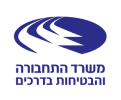
The information is based on the knowledge and experience of other parents and families. If you have additional information that is not listed here, please feel free to contact us.

Disability Allowance / Severe Disability Allowance (SAR’M) / Dependency Allowance – A basic allowance based on the level of disability and functioning of the individual.
Ventilator Allowance – For individuals who are on a ventilator for more than 16 hours per day (excluding devices like Irvo/Wafotherm).
Mobility Allowance – For those over 3 years old who cannot move independently. The allowance can be received with or without a vehicle. The allowance for those who hold a vehicle from National Insurance is approximately 1,000 NIS higher per month.
Disabled Vehicle – Individuals with mobility limitations who require a wheelchair (over the age of 3 and according to established criteria) are entitled to a loan for purchasing a vehicle adapted for special equipment (wheelchair compatibility). After 5 years, the loan becomes a grant.
Siblings Allowance – If there is more than one child in the family receiving National Insurance benefits (even if one is over 18, but not when both are over 18), the parents are entitled to an additional allowance equivalent to half of the allowances of the children receiving benefits (excluding the ventilator and mobility allowances).



Exemption from Fees for Medical Services – Those who are eligible for disability allowances are exempt from fees for medical services. The National Insurance Institute sends lists of potential recipients to the health funds, and the exemption should be granted automatically.
Health Fund Reimbursement/Nursing Hours – A monthly financial amount provided by health funds to assist families, according to their discretion and the recommendation of the social worker from the health fund. It is important to note that health funds are not legally obligated to provide this assistance, and the amount varies from one fund to another. Each case is considered individually. This assistance can be requested through the health fund’s social worker. (As of 2024, most health funds have decided to discontinue this assistance for recipients of the ventilator allowance from the National Insurance Institute due to the significant increase in the amount of the allowance.)
Food and Medications – According to the Director-General’s Circular, health funds are required to provide ventilator-dependent individuals with medical food, medications, and diapers without financial participation. This excludes food supplements and medications not included in the health fund’s basket. Most health funds provide free diapers for individuals over the age of 3.
If an individual is not classified as ventilator-dependent (according to the National Insurance Institute’s criteria), they receive food and medications with a financial contribution up to a certain limit, as determined by each health fund. One can always contact the health fund’s social worker and request assistance or discounts on the contribution cap.
Ambulance Services – According to the Director-General’s Circular, a ventilator-dependent individual is entitled to transportation by ambulance for medical treatments (round trip) with a commitment from the health fund to the ambulance company. This must be arranged in advance with both the health company and the health fund.
Hospitalization at ALYN Hospital – Most health funds subsidize up to 15 days per year for a ventilator-dependent child’s stay at ALYN Hospital for family respite. This must be coordinated with the department in advance and is subject to availability. These days are unrelated to the vacation days funded by social welfare.
Convalescence Days – Each health fund has a different policy regarding this. Most health funds offer convalescence days only after surgery, while Maccabi provides them after long hospitalizations, not necessarily after surgery.
Rehabilitation and Mobility Devices (wheelchairs, hospital beds, bathing aids, lifting cranes, special walkers, etc.) – Health funds assist with financing rehabilitation aids. The request for assistance must be submitted before purchasing the device. First, an occupational therapist from the health fund or educational institution must evaluate the need and submit the request for the device.

Disabled Parking Permit (תג חניה לנכה) – A regular disabled parking permit or a wheelchair disabled parking permit can be requested through the Ministry of Transportation’s website. Up to 2 disabled parking permits can be granted for each disabled person (for 2 different vehicles).
The disabled parking permit allows:
Reserved parking: parking in designated disabled spaces only when the disabled person is in the vehicle (misuse of the permit may result in a fine of up to 13,000 NIS).
Free parking in public parking areas.
Parking on sidewalks as long as it doesn’t obstruct pedestrian or wheelchair access.
Prohibited parking areas:
Bus stops, taxi stands, parking lot entrances, public transport lanes, fire hydrant zones, intersections, pedestrian crossings, or near them.
Wheelchair Symbol Parking Permit – This permit also allows driving in public transport lanes when the disabled person is in the vehicle (only available for those who use a wheelchair and are above 3 years old).
In general, traffic officers are typically more lenient with vehicles bearing this permit, even in situations that may not strictly adhere to the law.
Exemption from Vehicle Licensing Fees – Disabled parking permit holders are entitled to an exemption from vehicle registration fees. If two vehicles are registered to the same disabled person, only one vehicle will be exempt from the fee.

Foreign Worker – Individuals with disabilities (according to the established criteria) are entitled to provide a residence permit for a foreign worker to be employed. Ventilated patients are entitled to provide a visa for two foreign workers in order to receive full supervision, 24 hours a day.

Accessibility and Housing Adjustment – A person with mobility limitations or parents of a child with mobility limitations can receive financial assistance for apartment renovations to accommodate or modify the apartment (up to 65,000 NIS, and 130,000 NIS for the installation of a lift). Part of the funding is provided as a grant and part as a loan, based on income. The application can be made once by contacting the Ministry of Construction and Housing.
Rent Assistance (Rental or Mortgage) or Allocation of Public Housing for the Homeless – This benefit applies to people with disabilities or families with a mobility-impaired person who is confined to a wheelchair and is homeless (i.e., they have not had any rights to housing in the last 10 years). To check eligibility for the benefit, the applicant should contact the Ministry of Construction and Housing.

Assistant for Kindergarten and School – Funding for a dedicated assistant for children with medical needs (according to the applicable criteria) studying in regular educational frameworks.

Tutoring – Payment from the Ministry of Welfare for a tutor for children with medical needs (according to the relevant criteria) attending regular educational frameworks who do not receive extended school days (i.e., an afternoon program). The maximum number of monthly hours for each child varies depending on the regional office’s options and decision. To exercise this entitlement, the family must contact the social worker accompanying them at the welfare office. For children under 3 years of age, an “exceptional age approval” must be requested.
Discount for Siblings in Daycare/Nursery – Siblings of a child with a disability may receive a significant discount on daycare/nursery payments by submitting a request to the welfare office and after attending a committee called the “At-Risk Child Committee.”
Furniture or Electrical Appliances – A family with an active case at the welfare office is entitled to a reimbursement once a year for the purchase of furniture or an electrical appliance worth up to 2,000 NIS, with a receipt and prior coordination with the social worker at the office.
Care Hours – Payment for a tutor for siblings. The program is intended for challenging family periods and is limited to three months. The family must contact the social worker at the office.
Vacation Days – Every child with a disability is entitled to payment for 15 vacation days a year. The days can be used in the “Ezer Mitzion” program (hosted by a family or caregiver at the family’s home), in the “Siach Sod” guest apartment (not for complex medical cases), or in vacations arranged through welfare programs. In exceptional cases, it is possible to request an additional 15 days per year. The program is intended for children over 3 years old (for younger children, an “exceptional age approval” must be requested. Recently, approval for this exception has become rare).

Two Income Tax Credits – Parents of children receiving an allowance for a disabled child are entitled to two additional tax credits. The National Insurance Institute sends a list of potential beneficiaries to the tax authority.
Exemption from Taxes on Early Withdrawal of Pension Funds – Parents of a child eligible for a child disability allowance of at least 75% permanently may be entitled to an exemption, provided that the disability was discovered after the pension fund was opened. The National Insurance Institute sends a list of potential beneficiaries to the tax authority.
Real Estate Taxation – A discount on property purchase tax for purchasing a residential property or land for building a residential property, according to the regulations of capital gains tax. This discount is granted only twice. Parents of a child with a permanent disability of at least 100% (or 90% when multiple impairments are considered) are eligible for this discount. Additionally, a disabled person from a traffic accident, a paralyzed person, or an amputee with mobility limitations and at least 50% medical disability is eligible. The National Insurance Institute sends a list of potential beneficiaries to the tax authority. For inquiries, you should contact the Real Estate Tax Office.

Property Tax (Arnona) – Disabled individuals, as well as parents of children receiving a disability allowance for a child, are entitled to a discount. The amount of the discount is determined by the local authority. The National Insurance Institute sends lists of potential beneficiaries to local authorities. The discount should be granted automatically.
Parking Space Allocation – Vehicle owners with a disability parking permit are entitled to a parking space adjacent to their home. The allocation is made by contacting the local authority (municipality). Some local authorities allow for an exceptions committee for reserved parking spaces close to the disabled person’s workplace.

If the child has long-term care insurance (noted in the health fund, in addition to the regular and supplementary health insurance of the health fund), the chances are high that you are entitled to a significant financial compensation in the claim. However, not every lawyer specializes in this area. It is recommended to contact us for more details.

Electricity Company – People with disabilities or parents of children receiving a disability allowance (according to certain criteria) may be entitled to a 50% discount on the first 400 kWh of their electricity bill. The National Insurance Institute sends the list of eligible individuals to the Electricity Company, and the discount is typically provided automatically.
The electricity account must be a residential tariff and in the name of the disabled person or the parent receiving the allowance. If the parent has more than one electricity account in their name, they must arrange the discount with the Electricity Company via their customer service at 103.
Water Bill to “HaGichon” company – People with disabilities or parents receiving an allowance for a child with a disability (above 50% disability), according to the National Insurance reports, are entitled to an additional amount of up to 3.5 cubic meters of water per month at a reduced rate. The residential address of the disabled person or the parent receiving the allowance must be updated with the Ministry of Interior. The discount is provided automatically.
Bezeq – People with disabilities (above 80% disability) or parents of children with disabilities (above 100% disability) are entitled to discounts at Bezeq on: installation and relocation of a telephone line and on the phone bill.
Sick Leave for Parents for Personal Assistance – A salaried parent of a child or an adult with a disability is entitled to be absent from work (if employed for at least a year by the same employer) for up to 18 days per year on sick or vacation leave (at their choice) for personal assistance to a child with a disability (minor or adult).
In addition, the parent is entitled to be absent from work for up to 52 hours per year without pay deduction (if the other spouse is not employed, they may also add their hours). The entitlement can be claimed by direct contact with the employer, who may request relevant declarations and certifications. These days and hours are on the employer’s account as per the “Sick Leave for Employees” law.
Towing Services – A person with limited mobility who has purchased a car with an available loan and receives a mobility allowance is entitled to towing services without a replacement vehicle. Every year, a different company wins the tender to provide towing services for disabled vehicles.
As of 2024, the company “Shagrir” provides these services. The National Insurance sends the list of eligible individuals to the towing company at the start of each quarter. The phone number for the “Shagrir” towing service is 8888*.
How do you say “cannula” in Hebrew?
Anbuv! Actually, the term “cannula” does not have an official term in academic terminology. The alternative “Anbuv” is one of the innovations of Yosef Even-Odem (who was a doctor, linguist, and researcher about eighty years ago).
And how in Arabic?
In Arabic, “Al-Unbub” means “Abub,” “Khalil,” “cane,” “hollow tube in the body,” or “water pipe,” etc. (for example, “Unbub al-Riyah” means “windpipe”).